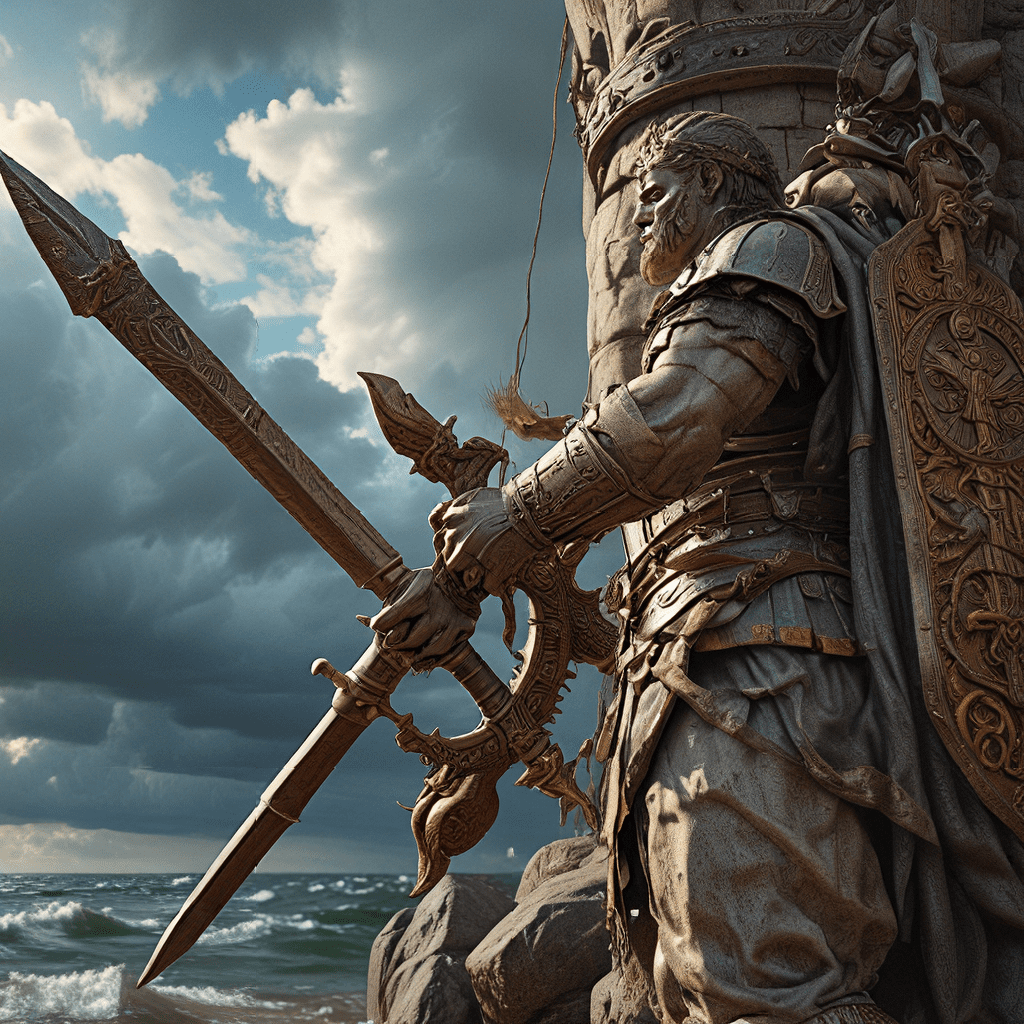The Dark Side of Divinity: Myths of Punishment Explored
I. Introduction
Throughout human history, divinity has played a crucial role in shaping cultural beliefs and moral frameworks. The concept of divinity encompasses a range of interpretations, often tied to the existence of higher powers or gods that govern the cosmos and human affairs. These divine beings are frequently portrayed as enforcers of morality, dispensing blessings or punishments based on human actions.
In mythological contexts, punishment serves as a mechanism to uphold divine justice, reflecting societal values and fears. The narratives of divine punishment often convey important moral lessons, warning individuals of the consequences of their actions. This article aims to explore the myths of punishment across various cultures, examining their implications and the broader themes they represent in the human experience.
II. Historical Context of Divine Punishment
Divine punishment has been a prevalent theme in ancient civilizations, where the actions of gods were believed to directly influence the fate of humanity. These civilizations often viewed divine retribution as a natural extension of their belief systems, integrating it into their understanding of morality and justice.
A. Ancient civilizations and their views on divine retribution
In many ancient societies, such as the Mesopotamians, Egyptians, and Greeks, divine punishment was seen as a way to maintain cosmic order. The idea was that gods would intervene in human affairs to correct moral imbalances. For instance, the Epic of Gilgamesh illustrates how the gods would punish humanity for their sins.
B. The role of gods in enforcing morality
Gods were often depicted as moral arbiters, whose judgments reflected the ethical standards of society. They enforced laws that governed human behavior, and their punishments served as cautionary tales to promote adherence to these laws. In Greek mythology, the gods would frequently act to punish hubris, or excessive pride, among mortals.
C. Evolution of punishment myths through history
As societies evolved, so too did their myths of punishment. The transition from polytheistic to monotheistic belief systems, for example, transformed how divine punishment was conceptualized. In Christianity, the notion of sin and divine judgment became central, with narratives of Hell and eternal damnation emerging as powerful deterrents against immoral behavior.
III. Major Mythological Figures and Their Punishments
Mythological narratives abound with stories of deities punishing mortals for transgressions, each illustrating a unique moral lesson.
A. Greek mythology: Zeus and the punishment of Prometheus
In Greek mythology, Prometheus defied Zeus by stealing fire and giving it to humanity. As punishment, Zeus condemned him to eternal torment, with an eagle eating his liver every day, only for it to regenerate each night. This myth explores themes of defiance and the consequences of challenging divine authority.
B. Norse mythology: Loki’s fate and the consequences of trickery
Loki, the trickster god in Norse mythology, faced severe punishment for his misdeeds, particularly for orchestrating the death of the beloved god Baldr. In retribution, Loki was bound in a cave with a serpent dripping venom onto his face. This story underscores the dangers of deceit and the inevitability of retribution.
C. Hindu mythology: The cycles of karma and divine justice
Hindu mythology emphasizes the concept of karma, where every action has corresponding consequences. This belief system illustrates how divine punishment is intertwined with the moral fabric of the universe, promoting a cyclical understanding of justice and retribution.
IV. Themes of Retribution and Justice in Myth
The myths of punishment often reflect deeper themes related to justice and morality.
A. The balance of good and evil in divine punishment
Many myths illustrate a balance between good and evil, where divine punishment serves to restore order. This duality is essential for understanding the moral landscape depicted in these stories.
B. The concept of moral absolutism vs. relativism in myths
Mythological narratives often grapple with the idea of moral absolutism, where certain actions are deemed inherently wrong, versus moral relativism, where context matters. This tension can influence societal norms and beliefs about justice.
C. The psychological impact of punishment narratives on societies
These narratives shape societal attitudes toward morality, instilling a fear of divine retribution that can influence behavior and reinforce cultural norms.
V. Punishment as a Reflection of Human Fears
The myths of divine punishment often mirror humanity’s deepest fears and anxieties.
A. The fear of the unknown and divine wrath
Many cultures express a profound fear of the unknown, leading to narratives that emphasize the dangers of invoking divine wrath. This fear serves as a deterrent against moral transgressions.
B. Societal norms and the perpetuation of punishment myths
As societies evolve, punishment myths can both reflect and reinforce societal norms, perpetuating beliefs about justice and morality.
C. The role of guilt and shame in human behavior
Myths of punishment often invoke feelings of guilt and shame, compelling individuals to conform to societal expectations and moral codes.
VI. Gender and Divinity: The Role of Female Deities in Punishment
Female deities frequently figure prominently in myths of punishment, often embodying themes of vengeance and justice.
A. Examination of goddesses who wield punishment (e.g., Kali, Eris)
Goddesses like Kali in Hindu mythology and Eris in Greek mythology demonstrate the power of femininity in punishment. Kali represents destruction and rebirth, while Eris embodies chaos and discord.
B. The intersection of femininity and power in myths of retribution
The portrayal of female deities in punishment narratives often challenges traditional gender roles, emphasizing the complexity of femininity and power dynamics.
C. Impact on gender perceptions in ancient cultures
These myths can influence gender perceptions, shaping how societies view women and their roles in moral and ethical frameworks.
VII. Modern Interpretations of Punishment Myths
Contemporary society continues to grapple with the implications of divine punishment, often reinterpreting these myths through a modern lens.
A. How contemporary society views divine punishment
In modern contexts, the fear of divine punishment may manifest as a metaphor for societal consequences rather than literal divine wrath.
B. The influence of mythological narratives in modern literature and media
Many works of literature and film draw inspiration from mythological narratives, exploring themes of punishment and justice in contemporary settings.
C. The shift from fear-based interpretations to more nuanced understandings
As societies evolve, interpretations of punishment myths are increasingly nuanced, allowing for a broader understanding of morality and justice.
VIII. The Ethical Implications of Divine Punishment
The myths of punishment offer valuable insights into ethical dilemmas and moral lessons.
A. Moral lessons derived from myths of punishment
These narratives often convey important messages about the consequences of actions, encouraging individuals to reflect on their moral choices.
B. The dangers of literal interpretations of punishment myths
Literal interpretations can lead to dogmatism, potentially justifying harmful actions in the name of divine will.
C. How myths can inform modern ethical debates
By examining punishment myths, contemporary society can engage in meaningful discussions about justice, morality, and the human condition.
IX. Case Studies: Real-World Applications of Punishment Myths
Mythological beliefs have historically influenced real-world events, shaping societal norms and legal systems.
A. Examination of historical events influenced by mythological beliefs
From witch hunts to societal purges, the fear of divine punishment has often justified extreme actions throughout history.
B. The role of punishment myths in contemporary societal issues
Understanding the legacy of these myths can illuminate current issues related to justice, morality, and social behavior.
In conclusion, the exploration of myths of punishment reveals deep-seated fears, societal values, and the complex interplay between divinity and morality. These narratives, both ancient and modern, continue to shape our understanding of justice and the consequences of our actions.




